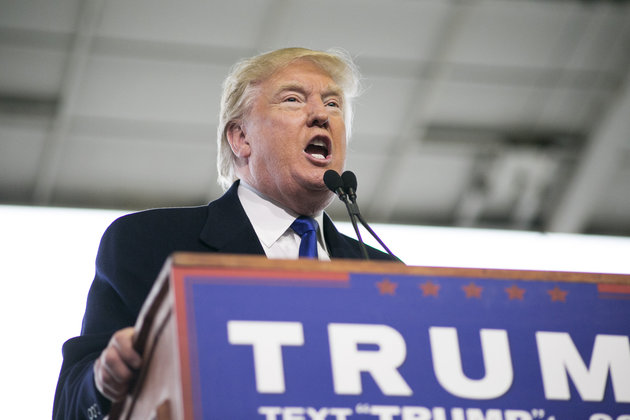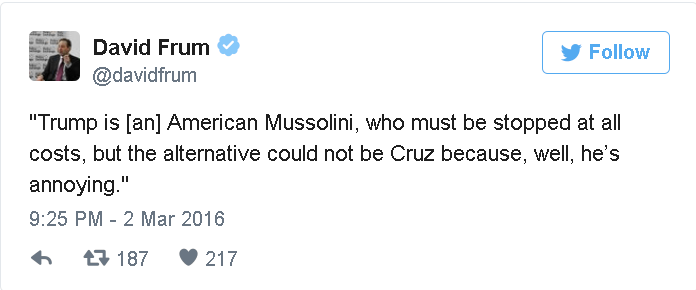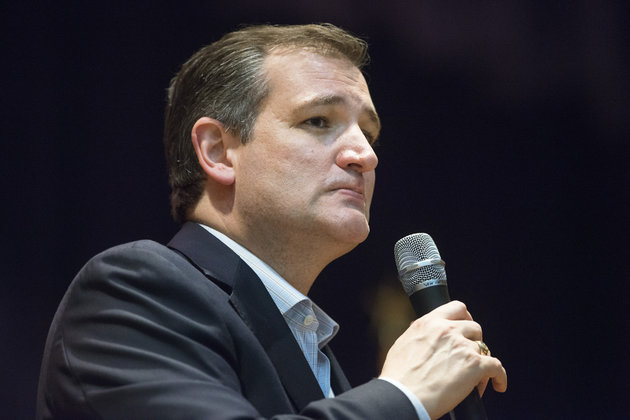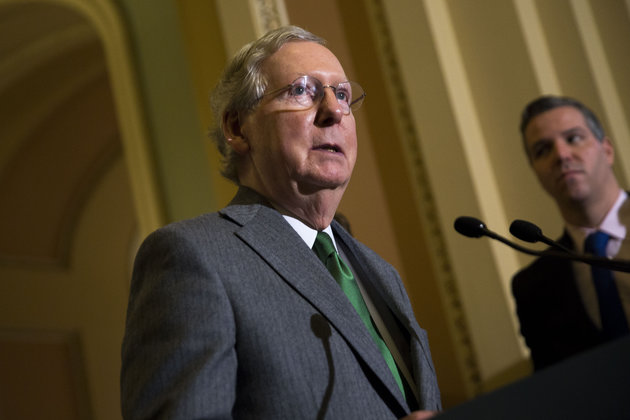
The news is filled with reports of senior Republican operatives, donors and elected officials frantically plotting to stop Donald Trump from securing the party’s presidential nomination.
Whatever they have been doing thus far plainly isn’t working: Trump won nine out of the 13 Super Tuesday states and is racking up key endorsements.
Florida Sen. Marco Rubio, the so-called GOP establishment’s preferred candidate, won just one state -- reliably Democratic Minnesota -- and did not even reach the 20-percent threshold needed to win any delegates in Texas.
But instead of coalescing behind a single candidate or a coherent anti-Trump strategy, the party’s mainstream power brokers are divided on how to proceed.
Is Cruz The Lesser Of Two Evils?
Some Republicans appear ready to get behind Texas Sen. Ted Cruz (R-Texas), who they loathe only slightly less than Trump.
There is no surer sign that Cruz is emerging as the most viable alternative to Trump than the tentative support of Sen. Lindsey Graham (R-S.C.), one of Cruz’s harshest critics.
Graham even joked about Cruz’s murder at a Thursday speech to the National Press Club.
“If you killed Ted Cruz on the floor of the Senate, and the trial was in the Senate, nobody would convict you,” Graham said.
But as the primary results coming in Tuesday night showed Cruz with three more states to his name, compared with just one for Rubio, Graham was singing a different tune.
"Ted Cruz is not my favorite by any means," Graham told CBS News. "But we may be in a position where we have to rally around Ted Cruz as the only way to stop Donald Trump."
Cruz has elicited the scorn of his Senate colleagues for vocally criticizing party leadership, claiming to be an arbiter of conservative orthodoxy and engaging in politically damaging stunts like backing the 2013 government shutdown.
But Republican officials’ aversion to Cruz has always seemed more personal than ideological. Perhaps aside from Cruz’s support for a return to the gold standard, a non-starter among business-friendly Republicans, his positions are much more palatable to the GOP elite than those of Trump.
That has left some to wonder why people like Graham did not get behind him sooner.

Of course, even Graham has conceded that it may be too late for Cruz to overtake Trump.
It is not hard to see why. Cruz took a smaller share of the vote in Texas than any other Republican presidential candidate to win their home state since 1912, according to Smart Politics, a nonpartisan newsletter circulated by University of Minnesota school of public affairs.
And new polling by NBC News shows both Cruz and Rubio losing to Trump in a head-to-head matchup, with Rubio actually faring better against him than Cruz would.
Dreaming Of John Kasich
The indecisive results of the primaries up until now have sown just enough doubt about Cruz and Rubio as viable alternatives to Trump to keep Ohio Gov. John Kasich chugging along.
Kasich and his backers, which include Sen. Rob Portman (R), a fellow Ohioan, argue that a Kasich win in Ohio’s March 15 primary will revive him as the GOP establishment favorite.
And although NBC News did not examine a Kasich-Trump matchup, it is not clear Kasich has any better or worse chance against Trump in a head-to-head matchup than the other two possible contenders.
John Feehery, who was a spokesman for former GOP House Speaker Dennis Hastert and now heads the communications practice at Quinn Gillespie, a bipartisan lobbying firm, said he still believes that “patience” can prove Kasich is the party’s best chance at stopping Trump.
“I want to see what happens in Ohio,” Feehery said.
Meanwhile, BuzzFeed reported that top party leaders like Senate Majority Leader Mitch McConnell (R-Ky.) are furious that Kasich has stayed in the race, and worry he may have cost Rubio a win in Virginia. Mitt Romney has personally asked Kasich to stand down, according to the news site.

Let A Thousand Flowers Bloom
Other prominent Republicans see a path to stopping Trump with a divided field.
The top Republican donors behind Our Principles PAC, the largest and wealthiest anti-Trump Super PAC, convened a conference call on Tuesday to raise money for a more robust effort to sink the real estate mogul’s candidacy.
But participants in the call did not discuss getting behind a particular candidate, according to The New York Times.
The group, which had just over $500,000 cash on hand at the start of February, is showcasing its anybody-but-Trump approach with a new web ad, “Unelectable,” that claims Trump’s racism will cause him to lose the general election in a landslide.
The Make America Awesome PAC, an anti-Trump Super PAC founded by veteran Republican operatives Liz Mair and Rick Wilson to much fanfare in November, says it has plans to release anti-Trump ads in more states in the coming days. However, the group had just over $10,000 in cash on hand at the start of February.
Mair said the Super PAC has no immediate plans to get behind one candidate exclusively, but will instead “indirectly aid any remaining [Republican] over Trump and indeed different ones [in] different places to block him.”
The notion of allowing a divided field to battle it out with Trump may make more sense given the prospect of what is known as a “brokered convention.”
As of December, Republican party officials and power brokers were preparing for a scenario in which no candidate wins a majority of delegates in the first round of voting at the GOP national convention in July.
Delegates bound to one candidate in the first round of voting due to primary results in their state would be free to vote as they see fit in subsequent rounds, allowing deal-making with Republican insiders to play a bigger role than it usually does.
Creating a process of natural selection among Trump alternatives ahead of the convention might ease that process along.

Managing Defeat
If acceptance is the final stage of grief, at least some prominent Republicans appear to be emerging from mourning Trump's takeover of their party.
New Jersey Gov. Chris Christie (R) and Maine Gov. Paul LePage (R) have both endorsed Trump, and Florida Gov. Rick Scott (R) may be next.
Sen. Jeff Sessions (R-Ala.) announced he will be backing the real estate mogul, as have Reps. Chris Collins (R-N.Y.) and Duncan Hunter (R-Calif.).
Sen. Mike Rounds (R-Idaho), a Rubio supporter, said on Tuesday that even if Trump is equivocal about the Ku Klux Klan, he would be preferable to whoever wins the Democratic presidential nomination.
But other prominent Republicans like former New Jersey Gov. Christine Todd Whitman and Mitt Romney 2012 campaign manager Stuart Stevens have said they would vote for Hillary Clinton, the likely Democratic nominee, instead of Trump.
The possibility of attrition from more moderate Republican voters and independents is one reason why some Republican party leaders assume Democrats will retain the presidency and are already taking precautions to stem losses elsewhere.
The New York Times reported that Senate Majority Leader Mitch McConnell (R-Ky.) has told colleagues in reference to Trump, “We will drop him like a hot rock.”
McConnell apparently hopes that distancing Senate Republicans from Trump will at least allow the part to maintain control of the chamber, as many GOP legislators face tough reelection races.
- Publish my comments...
- 0 Comments
